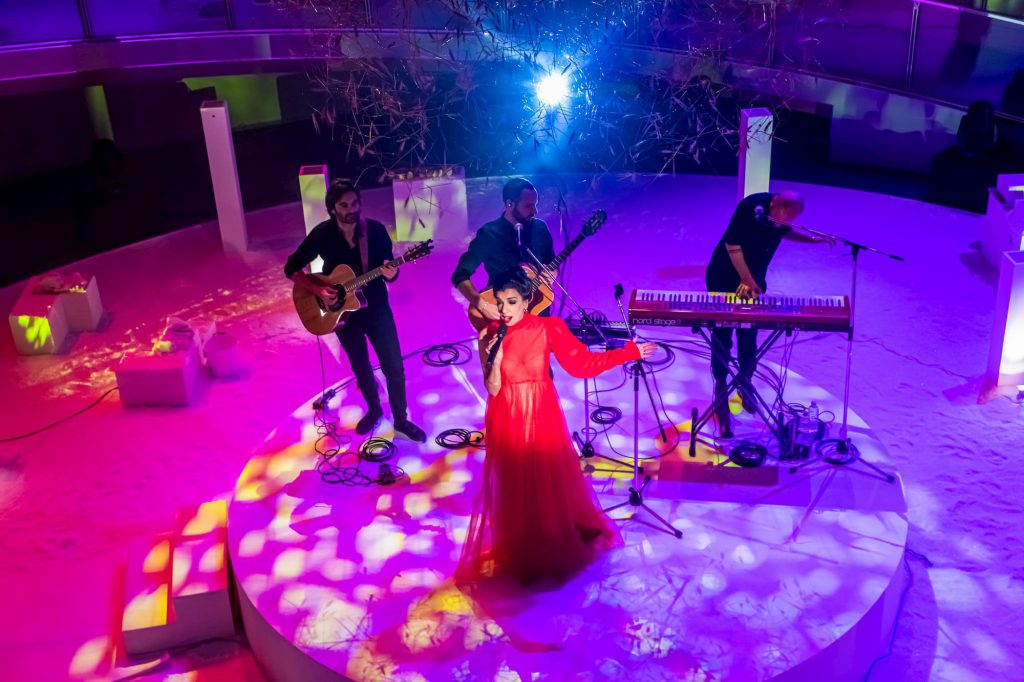
From a young age, Dikla has promised to herself that one day she will do a creative revolution in Israel. She had a dream to write, compose and create, in order to change the current situation. “When we are kids we promise ourselves many things, we have this image in our mind of a bright and bigger than life kind of future. But real life is a bit different. I do think I’m fulfilling my promise to myself, but is that the same? I can’t say yes for sure” She says, but from looking at her career, Dikla has definitely scored many goals.
She was first exposed to music in her family home in Be’er Sheva, where the family members used to listen to Arbic, Tuekish, Egyptian music alongside new American and Israeli music. As a curious girl who absorbed her surroundings at all times, she also listened to diverse and different types of music around her neighborhood, like metal and classical music. Her childhood was influenced by many musical genres and this can be seen reflected in the music she produces today. Her musicality is expressed in combination, never one specific genre. Between black and white, between East and West, between modern and old. She has the need to search for something that can contain everything, find a lot of colors but still have one guideline.
“The biggest impact is actually my family and my neighbors. There was one neighbor who particularly influenced me, his name was David.” Dikla tells about a neighbor who used to lay down on a brick wall and next to him, a tape and a bag with thousands of tapes, which she would see on her way to school.
“I would sit with him before and after school, the only one who approached him, and listen to music with him. We sat like this for hours without talking to each other. It's something that has influenced me so much, he was fulfilling himself through listening to music. There are many characters who have influenced me like that. “

When asked what message she wants to convey in her music, Dikla said: “I want to heal myself first through music. I am not an educator, I have never treated my own music as some kind of educational tool, perhaps as a therapeutic tool. I think that first and foremost, my goal of mental research, of my own mind, to first and foremost to be healed. Maybe find an answer or a way, through words or melody I wrote. Maybe this will give an answer to my endless questions. At the end of the day, I am like everyone else, there is a beginning, a middle and an end, there are stories of love, betrayal, disappointment, dreams that will not come true. Bottom line, my message if I look at things in retrospect, is that you can do a lot with nothing. You have to go with yourself even when all odds show against you. It's the message as an outer shell, it's the frame story. What's inside is hours of living, it's everyday, relationships, a lot of attempts to resolve relationships. I would like to be healed from my own prison, my thoughts and history. From my seriousness, drama and humor, my beliefs about myself. Many times we are not us, and go figure who you are, with all this noise.”
A few years ago she became a mother for the first time, and the experience changed and affected her greatly.
“Suddenly I see my motherly side, until a later age I did not really know I had it in me” she says.
“I was sure I was an artist and did everything for the stage, art and music. It is very difficult for me to take a break, because I am a manufacturer, I must produce. I have to produce music, I have to be there, it’s like breathing to me. But beyond that I can not help but be with my daughter, my daughter is stronger than anything.”
In 2014, she had a number of big hits that received millions of views on YouTube and were played frequently on the radio, after being considered for several years to be a quality singer but failed to be exposed to the general public.
Since then she has been working non-stop, releasing hits and music videos and performing on the biggest stages in Israel. Then came the Covid-19 and with that a new reality that is hard to get used to.
“For the first two months of the crisis I was in a good mood because it was a bit quiet, no one was calling and nothing was urgent. There was something comforting about it, a bit like a vacation, of course with a lot of stress but not stress of work and livelihood. Because work requires a lot of stress so there was some kind of laxity. Now the situation is different, we have started to go back to normal and it is stressful, because what will happen with money and the economy.
Now we are again in some kind of tension, allowed to perform or not how much livelihood will there be in it. Is it time to put out new songs, because they are not accessible in performances, it is a system that depends on each other. While I was at home I did not create, now I have started to create again.”
She first came to Japan in 2019 as part of “Jerusalem Design Week” held in Tokyo. Despite the fears that arose from the differences and distance between the countries, Dikla fell in love.

“Japan felt different to me, maybe it's the presence of a lot of Israeli and Japanese people, I felt at home and it was very comfortable.”
Dikla says when she is asked about her thoughts on performing in a foreign and distant land.
During the week she appeared before a Japanese audience for the first time in Hebrew.
“The Japanese audience, I was so impressed with them, they were very kind. They smile, get excited, and applaud, even though they did not know me at all and it really moved me. I did not feel foreign, that it always scares me in foreign places and here I did not feel that way. One of the beautiful moments I had in Japan was the show, it was just a stunning and respectable show and I really, really enjoyed performing. During the show, I saw a little Japanese girl around my daughter's age and I approached her, I sang to her and people around me got excited and shed a tear. “
Japan left such a strong impression on her that she incorporated the word Arigato in a new song she released when she returned. The song is called “Just Say It” and it describes a journey, a journey to Japan on its way to the 80th floor of a hotel in Tokyo. She wrote the song based on the Japanese word and made sure everything connected around it.
“Rak Tagidi”
Falling in love with Japan has raised a desire to collaborate with Japanese artists.
“Connecting cultures through music can create a new language.”
The songs that Dikla recommends to the Japanese audience:
“Sheva Ba'erev”
“Ve'im Preda”
“Maskara Shchora”



